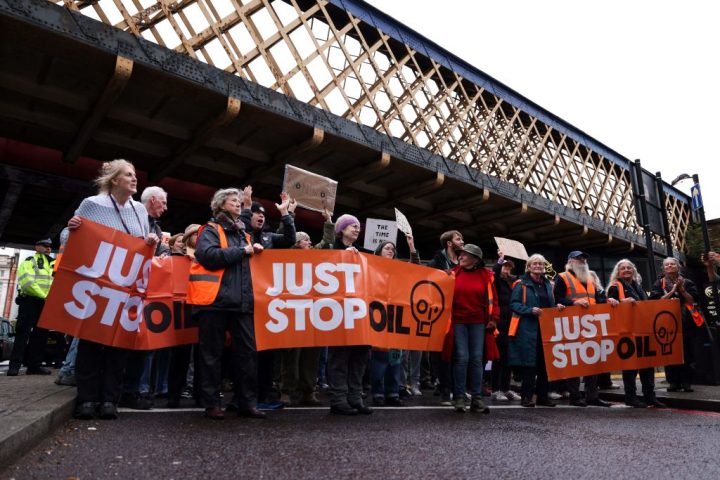Do you remember when you couldn’t get your child to school on time because of a Just Stop Oil slow march? Or when you got gridlocked on the M25 because someone had draped themselves over one of the gantries? There’s a man from the United Nations who, it seems, rather likes the idea of us going back to those times.
Michel Forst, a French UN functionary with the grand title of ‘special rapporteur on environmental defenders (Aarhus convention)’, published a two-page report this week following a brief visit to London. In it, he referred to ‘extremely worrying information’ about Britain’s ‘increasingly severe crackdowns on environmental defenders’, by which he meant Just Stop Oil and those like them.
The notion that Just Stop Oil is somehow being punished for exercising their Aarhus rights is preposterous
It was unacceptable, he suggested, to punish such ‘peaceful protesters’ for public nuisance, or to crack down on them for conducting slow marches deliberately designed to make roads unusable. Forst said it was wrong to prevent environmentalists accused of criminal offences telling juries all about climate change so as to enable the latter to make an ‘informed decision’. He was also ‘troubled’ that the courts had issued injunctions preventing criminal acts, with people being imprisoned for breaking them. The Frenchman found it equally distressing that environmental protesters should be ‘derided by some of the mainstream UK media and in the political sphere’ so as to subject them to threats and abuse from ‘unscrupulous persons’.
This whole paper is consistently wrong-headed. Only someone from the rather unreal surroundings of the UN could write such a document.
For one thing, the reason why most people are happy to accept peaceful protest is that it is, well, peaceful. It aims to persuade, not to impose views willy-nilly. Does Forst think that peaceful protest should include forcibly stopping other people from going about their business to make sure your view prevails? If so, he’s wrong: it doesn’t.
As for the suggestion that something must be done about the ‘deriding’ of environmental protesters, it’s hard to see this as anything other than a naked call for more governmental restrictions on free discussion.
Forst’s overall suggestion sails close to suggesting that minority pressure groups should be treated differently. Such an idea is not so much humanitarian as unhinged.
Coming from someone working for an international organisation, this report is a worrying attack on democracy. By and large, we in Britain are pretty tolerant of the odd boisterous demonstration. Most of us feel that you shouldn’t stop protesters speaking their mind in an attempt to persuade the rest of us to agree with them, and many perhaps even vote accordingly.
Whether the UN likes it or not, the reason the government took the measures it did last year against bodies such as Just Stop Oil or Extinction Rebellion was precisely that they had gone way beyond this. Their tactics involved not so much seeking to get their view across, as to coerce an elected government into adopting measures that nobody apart from a tiny minority wanted implemented.
Their demands would have made the entire nation that elected that government miserable. People were rightly exasperated with that. That is democracy in action. Forst would do well to bear that in mind.
It’s also worth a slightly closer look at how this report appeared at all. Forst’s title refers to the Aarhus convention. This fairly benign 1998 treaty, ratified by over 40 states including the UK, requires governments to give people access to environmental information and a say on decisions made about environmental matters affecting them. Forst’s mandate relates to the observance of Article 3(8) of that convention, requiring states to ‘ensure that persons exercising their rights in conformity with the provisions of this convention shall not be penalised, persecuted or harassed’.
The difficulty here should be obvious. The convention gives environmentalists the right to say what they think, but nowhere does it mention a right to engage in obstructive protest, or deliberately and criminally disrupt other people’s lives in order to force compliance with their environmental message. The notion that Just Stop Oil or their friends are somehow being punished for exercising their Aarhus rights is preposterous.
The conclusion is pretty inescapable: the worthy special rapporteur appears to be using his mandate, not to ensure that the UK keeps its treaty commitments, but as a means to demand that our government leave Just Stop Oil and the like alone, with the effect they would be free to impose their will on the British people.
Where we go from here is unclear. The instrument appointing Forst technically gives him the power to issue ‘protection measures’, that is orders directing states (yes, you read that right: directing them) to refrain from penalising environmental defenders. We may yet see such a measure land on Rishi Sunak’s desk. If it does, Sunak must politely, but forcefully, tell Forst that Britain observes the Aarhus convention, that the threat to environmental defenders exists only in his fevered imagination, and that how we enforce our criminal law is frankly none of his business.






Comments